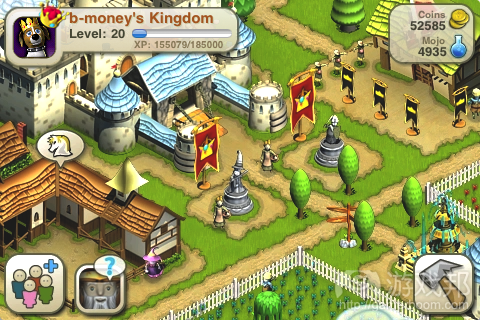社交游戏设计需善用玩家的作弊行为
游戏研究者Amy Jo Kim 、Nicole Lazzaro 和Ian Bogost曾讨论过游戏设计者是否应该允许有闲多过有钱的玩家购买虚拟货币,以减少游戏中的苦力活。这个策略现在已在大部分社交游戏中实现了。
我又于无意中发现了Mia Consalvo关于电子游戏中的作弊行为的研究,她发表了在社交游戏中购买虚拟货币是否可以称为作弊行为的看法。
Mia Consalvo认为,人们在游戏中作弊(利用游戏攻略、作弊代码、黑客软件和脚本程序、购买非法物品或使用欺诈手段等),主要有以下四点原因:
1、因为他们自己没有技术来进阶到下一个关卡,要摆脱困境就得作弊。
2、他们太贪婪,妄图不耗费重复的功力就获得扩展游戏经验的高级物品。
3、他们对游戏的线性剧情叙述方式心生厌倦,希望走在游戏时间轴的前面。
4、他们希望欺骗他人,借助不公平优势获得最终胜利。
Mia表示作弊行为在游戏中也存在有利的一面。玩家经常受困,或感到厌烦,然后就行骗以提前到达某个级别或获得游戏经验,这有可能决定玩家是完成游戏还是半途而废。当新玩家向高级玩家寻求技巧时,良性作弊行为可以促成一种群体的感觉,甚至帮助设计师定位游戏断层,从而改进游戏。
Mia还提出,社交游戏已经在这种作弊行为上建立了商业模式。你可以免费玩游戏,但如果你想要跳过游戏中的苦差事,你可以购买技能、经验或用虚拟货币购买虚拟商品。另外,因为许多游戏属于合作型的,通过购买虚拟货币来作弊,往往对游戏玩法没有负面影响。
阅读Mia的文章,我受益匪浅。社交游戏的运营模式有赖于玩家的作弊、购买虚拟货币和虚拟商品。所以,社交游戏应该设法优化作弊行为。
返回玩家作弊的四个原因,社交游戏设计师应该提供更多付费解琐技能,提升经验的机会,以及增加游戏体验的独特虚拟商品,以非线型方式探索游戏的平行剧情,允许他们在游戏初期不费力地升级,为玩家制造更多作弊机会。当然,挑战就在于如何制造有助于增加而非削弱游戏玩法的作弊机会。(本文为游戏邦/gamerboom.com编译,如需转载请联系:游戏邦)
Four Reasons Why Gamers Cheat: How to Design Social Games to Optimize Cheating?
Welcome to the Gauravonomics Blog for Marketers, Entrepreneurs and Activists! Follow the blog on RSS, Twitter or Facebook and you’ll never miss a post again!
I recently wrote about a Social Gaming Summit 2008 panel discussion on fun in game design where game researchers Amy Jo Kim (@amyjokim), Nicole Lazzaro (@nicolelazzaro) and Ian Bogost (@ibogost) discuss whether game designers should allow players who have more time than money to buy virtual currency to cut through the grind, a tactic that is built into most social games now.
Today, I came across Mia Consalvo‘s research on cheating behavior in video games, and her interview on whether buying virtual currency in social games can be called cheating.
Mia says that people cheat in games (use walk-throughs, cheat codes, hacks and scripts, buy items illegally, or use deceit) because of four reasons –
1. They are stuck because they don’t have the skills and experience to advance to the next level on their own.
2. They are greedy, and want to unlock the advanced goodies to extend the play experience without grinding through the repetitive gameplay.
3. They are bored with the game’s linear storyline, and want to jump ahead in the game’s timeline.
4. They want to cheat others and win conclusively, by gaining an unfair advantage over them.
Mia argues that cheating in games might be good in some cases. Players often get stuck, or bored, and cheating to skip ahead or extend the play experience might be the difference between completing a game and abandoning it mid-stream. Good types of cheating can help create a sense of community as beginners seek out more advanced players for tips, and even help designers identify breaks in the game flow and build better games.
Mia also argues that social games have built a business model on such cheating behavior. You can play the game for free, but if you want to skip the grind, you can buy skills, experience, or virtual good by paying for virtual currency. Also, as many social games are collaborative, cheating by buying virtual currency often does not have an adverse impact on gameplay.
As I was reading Mia’s interview, I had an Aha! moment. The social game business model depends upon players cheating and paying for virtual currency and virtual goods. So, social games should be designed to optimize cheating.
Going back to the four reasons why players cheat, social game designers should create more opportunities for players to cheat by offering paid opportunities to unlock skill and experience to play the game in flow, exclusive virtual goods to enhance the game experience, parallel narratives to explore the game in a non-linear manner, and early upgrades to level up without the grind. The challenge, of course, is to create these cheating opportunities so that they add to the gameplay, not detract from it.
Which games, in your opinion, are striking the right balance between offering attractive opportunities to cheat and maintaining a fun game experience for non-paying players? Do share your insights in the comments below.(source:gauravonomics)
下一篇:快速发行是未来游戏行业的发展趋势








































 闽公网安备35020302001549号
闽公网安备35020302001549号